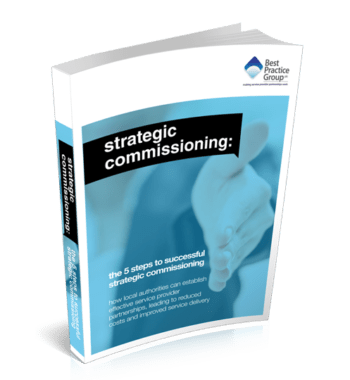 While some people revel in breaking through established boundaries, the vast majority would prefer the stability and relative comfort of the status quo. Change may befall an organisation in a myriad of ways, but all are likely to bring with them a degree of anxiety.
While some people revel in breaking through established boundaries, the vast majority would prefer the stability and relative comfort of the status quo. Change may befall an organisation in a myriad of ways, but all are likely to bring with them a degree of anxiety.
A takeover of your strategic supplier by another organisation is one of the more significant manifestations of change. It’s important to have a strategy in place for channelling the inherent accompanying fears in a direction that will help to improve performance in the short to medium term.
Five steps to improving supplier performance after a takeover
Our experience of hundreds of strategic supplier relationships in this arena has allowed us to condense the knowledge we have gained into an evidenced-based succinct, top-level view of the five steps your organisation can follow in order to improve supplier performance after a takeover.
These include: being more business case-centric, making a list, taking an introspective look, revisiting your contract terms for answers, and meeting your supplier with an open mind and justified reasoning.
-
-
Being more business case-centric
-
While a business case is usually at the centre of all activity that goes on between a client and their supplier, it is inevitable that the clarity with which it was visualised by everyone at its inception will change over time. Some may even find themselves deviating significantly from the goals and aspirations clearly defined within those pages.
Changes in your expectations and business outcomes over time mean you’ll need to revisit and potentially realign your business case to once again place it at the centre of your collaborative partnership. Also, reminding yourselves where your relationship is heading can offer evidence of where either party has deviated from the KPI path so they can be gently, or otherwise (as appropriate), persuaded back into line with your business case aspirations.
-
-
A gap analysis of expectations versus actual delivery
-
You will need to compare actuals against expectations and identify evidence of where issues exist which could be pulling your relationship in the wrong direction or dragging it down. Schedule these in an articulate manner, along with both the operational and financial impact they are having on your organisation.
When you speak with your suppliers, you want to have all the information to hand to back up your claims and explore between you what things need to change. The supplier’s takeover has been the refocusing agent that was required and now a new era needs to start – an era of honesty and trust between you both as collaborative partners.
It would do little good to throw around unsubstantiated claims of a supplier’s ills, but a list of issues with evidence to support them and the right attitude to resolve them can go a long way.
-
-
Taking an introspective look
-
While infinitely more convenient than the alternative, blaming everything on a supplier without having the appropriate objective evidence is likely to result in significant push-back and damage to the commercial trust you may have built up with them.
In any complex service delivery relationship, there are likely to be hundreds of opportunities for misunderstandings and inadvertent own-goals to arise on both sides – late responses or delivery, inaccurate information, personality clashes, poor behaviours, and so on.
It is important to take this opportunity to have a good long look at the way your own team has conducted itself and, where issues are recognised, they should be acknowledged and included within your plan for change going forward.
Consider this a ‘cleaning house exercise’, and while it presents a far more honest face to your discussions with your supplier, it can also take some of the sting out of any pushback you might receive.
-
-
Revisiting your written contract terms for answers
-
Now that you know what you wish to change, by how much, what proportion of the adaptation is in your court and how far you’ve deviated from your optimal path, you can look to the one guide you already possess for advice: your written contract terms.
While some legal guidance can be gained from an understanding of implied legal responsibilities and case law, it is your contractual agreement that you have tailored to your relational needs, so consult this before you take things any further.
This is a part of your evidence gathering process, to determine what was considered ‘reasonable’ by both parties at the outset of your relationship so you can show how far parties have deviated from this over time. Your contract may well also contain some of the answers you’re looking for, recourses open to you to escalate matters or realign the relationship.
If you utilise strategies determined and agreed by both parties at the outset you are far more likely to get a warmer response from your partner than if you look to develop solutions from scratch.
-
-
Meeting your supplier with an open mind and justified reasoning
-
Everything has been leading to this moment. All the planning, the information gathering, revisiting your agreement, and your business plan. To build a stronger, more productive and closer working relationship with your supplier partner you need to sit down, face to face, and explore both your and their concerns – in a constructive way.
This is not an opportunity to apportion blame. This is your chance to begin anew, to show your intent through listing your own failings and how you intend to address them, as well as evidencing your supplier’s need to change, while asking for their help in realigning the relationship.
The approach you take here, the language you use, the justification you give and the tone you set will determine whether your relationship has a greater chance of surviving (and thriving) or not.
What now?
It’s time to get started. Nothing can change until you start the ball rolling by following the steps above, though, of course, they are simply the raw ingredients to a far deeper programme to attempt to build a more productive relationship with your supplier post-takeover.
If you feel that the situation could benefit from someone looking at things from a different perspective, an external pair of eyes, you may wish to instruct an independent consultancy. Sometimes an outside analysis can dig deeper and ask the difficult questions that an in-house team may not be able to without putting additional strain on an already fraught relationship.
Should this be the case, do click here >>

